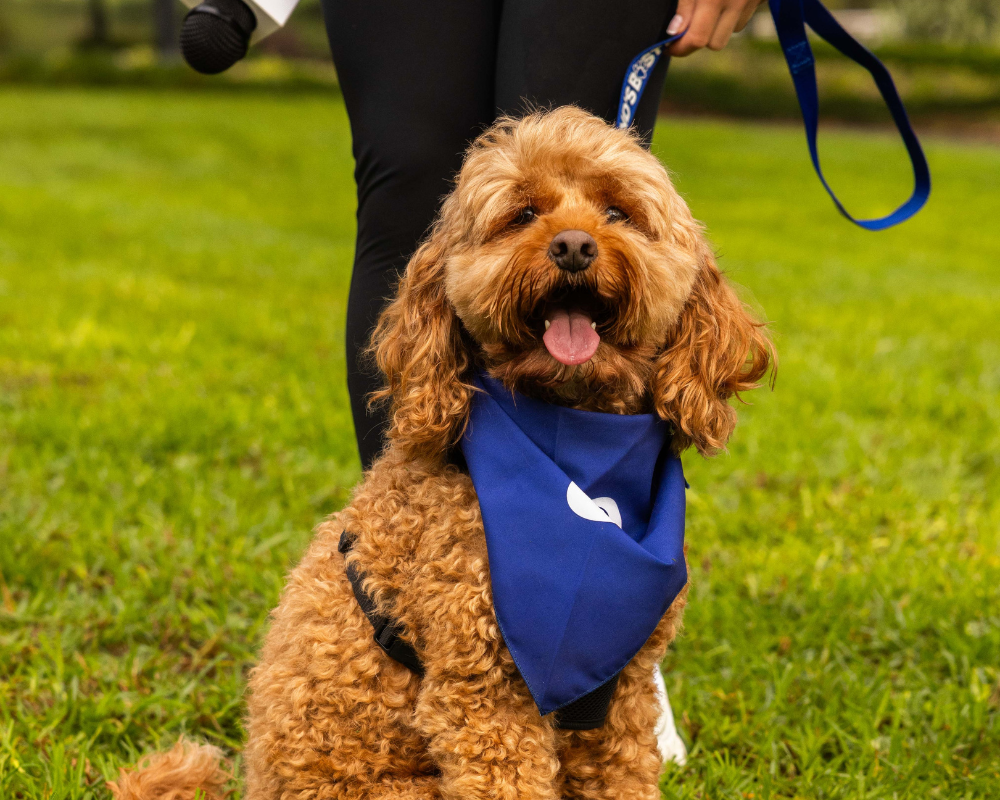Anxious pet? You’re not alone. With pets and people alike, mental and environmental stresses have increasingly been brought into the spotlight over the last year. This has not only had an impact on our mental health, but the mental health of our pets. Reviewing simple things like the diet of your anxious pet, and enjoying regular activity sessions with a certified trainer should be the first steps to helping your pet cope with anxiety. However, it is becoming increasingly common for pets to be prescribed with daily anxiety medications to help them cope.
4Legs Veterinarian Dr Felicity Banks says, “Of course, in certain circumstances, anxiety medication may be prescribed, but it definitely shouldn’t be the norm.
Anxious Pets + Medication Side Effects
Anxiety medications are generally well-tolerated by pets, but they are not always free from side effects.
“Possible side effects depend on the type of medication and include increased aggression, increased anxiety, agitation, increased or decreased appetite, gastrointestinal upsets, wobbliness, disorientation, sedation, tremors and increased likelihood of seizures. Pets on anxiety medication are also at risk of serotonin toxicity, a potentially fatal condition where too much serotonin ends up in the body. Early signs include agitation, tremors and seizures. Owners with medicated anxious pets need to be on the look-out for any of these signs.
“Understandably, owners are often looking for a magical cure and vets can be pressured by clients to prescribe anxiety medication. The reality is that for most dogs, their anxiety will not go away overnight or without a high level of commitment from the owner to provide necessary lifestyle changes and training.
“If anxiety medication is to be used, it should always be supported by behavioural modification. Anxiety medication should not be used as a standalone therapy for anxiety-related behavioural issues. Owners of anxious pets should not expect medication to provide a robust solution without being prepared to do the training. Training on the other hand, can of course be used without medication and can therefore be pursued when behavioural issues are not severe.”

Easing Anxiety Without Medication
Mark Ehrman, founder of Sydney’s Canine Counselling, says his business is booming due to an influx of local dogs with anxiety issues, leading to a range of behavioural problems. He has also noticed more and more dogs being prescribed medication to treat anxiety.
“As you can imagine, COVID has only added and heightened anxiety issues in many dogs and therefore a lot of my training has focused on firstly identifying the type of anxiety being experienced and then providing the relevant training regime for owners to implement themselves,” Mark said.
“Anxious behaviour in pets can be characterised in one of two ways; Separation anxiety, where a pet feels that its owner has left and is never coming back and fear anxiety, where a pet is afraid as soon as it leaves its home because of the potential or possibility of encountering something that it is fearful of. So as soon as it leaves home it displays anxious behaviour like hyper vigilance, extreme reactivity or sensitivity, even though the trigger isn’t present.
“Like us, our pets have suffered from the impact of COVID however, medication should not always be the first point of help. While some pets do require medication to deal with their condition, medications can come with side effects as Dr Felicity has mentioned, so we never want to start there.”

Mark recommends trialing the following training techniques to minimise both types of anxiety:
- Build their confidence by being a role model: No need to molly-coddle, but if you are calm, cool and confident, then your anxious dog will gain confidence from you.
- Avoid punishments: Understand that their anxious behaviour is rooted in fear, so it isn’t voluntary and shouldn’t be subjected to punishments. Harsh punishments can inadvertently make things worse!
- Use food to change their associations with potentially scary places or objects: You can’t reinforce fear, so giving them a treat when they’re anxious won’t make things worse. It can actually make them feel better about the place or object. So be generous with the treats and if they aren’t accepting them, that’s a strong sign that they are overwhelmed.
- Keep their world small and predictable: Anxious pets benefit from repeated, brief exposures. Prolonged or intense exposures can actually be overwhelming or traumatic, so slow and steady is the key to success.

Holistic Solutions
On top of a training regime, Dr Felicity also suggests looking at the anxiety issue in a more holistic way such by examining the pet’s lifestyle and diet, before turning to medication.
“It seems simple however it is so often overlooked and underestimated. Small changes such as a balanced diet and lifestyle adjustments can significantly improve your pet’s overall wellness and prevent issues related to anxiety and stress.”
“Often pet owners are unaware of the mistakes they are making which, over time, can impact their pet’s health and in some cases shorten their lifespan. Ultimately a healthy pet is the result of a balanced, nutritious diet, a consistent routine, mental stimulation and regular exercise each day.”
Dr Felicity recommends trying the following four steps to help anxiety in pets:
- If you don’t already, replace dry food with one fresh meal a day, ensuring your pet’s diet is complete and balanced. Limit processed food and food that has additives and preservatives.
- Freshen up your pet’s bowl with a water change twice a day. Like humans, dogs need an adequate amount of fresh water each day for their general wellbeing, with proper hydration having both long term and short-term impacts on their health.
- Ensure you are feeding your dog the right portions at each mealtime. You can utilise tools like the 4Legs dog food calculator to help calculate this.
- Provide your dog with regular daily exercise as this will keep them both physically and mentally fit. I recommend forty minutes of exercise daily, which can be made up of walks, playing games with them at home, teaching them to learn new tricks at home or a dog school and socialising them with other pets.
For pets with milder behavioural issues associated with anxiety, changing their diet and lifestyle or employing a trainer to guide the owner through behaviour modification and training techniques is an excellent starting point.
Anxious Pets who are struggling with severe or chronic presentations of the condition, that are showing highly destructive, dangerous or self-harming behaviours should see a vet urgently before they see a trainer. For these pets, medication can be highly beneficial or even necessary. This is because the stress responses they experience due to their anxiety can override their ability to learn properly and can prevent successful training. A good trainer will always refer these animals back to the attending vet for assessment if they feel training alone will not be successful.















